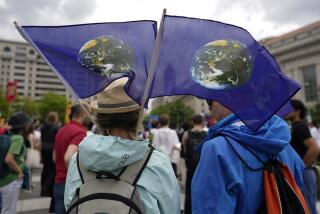TV REVIEW : The Biologist Who Took on DDT
- Share via
If Rachel Carson’s story were fiction, no one would buy it--too many cliches. Consider: A soft-spoken-but-determined young woman becomes a scientist in an era when women aren’t even encouraged to attend college, then channels her love for nature into a courageous crusade that pits her against the powerful leaders of industry and agriculture. Her victory changes the course of the world.
That’s the slice of contemporary history examined in “Rachel Carson’s Silent Spring,” part of “The American Experience” series (at 9 tonight on KCET-TV Channel 28, at 8 on KPBS-TV Channel 15 and KVCR-TV Channel 24). Carson, one of the first women biologists ever hired by the U.S. Fish and Wildlife Department, spent five years documenting her 1962 book warning that unregulated pesticide use posed a peril to all future life.
The drama of that message might be hard to comprehend in today’s world, where toxic is a nervous, everyday word. But in the 1950s, pesticides, developed during World War II, were hailed as a miracle and introduced into agriculture on a massive scale. Tonight’s sampling of early ‘60s news clips proudly showing crop dusters and health agency trucks spewing plumes of pesticides over farms, cities and even groups of laughing schoolchildren is a horrifying bit of social history.
“DDT was cheap, and we loved it,” comments NPR’s Alex Chadwick, who narrates the documentary’s blend of personal interviews, film clips and the words of Carson herself (who died in 1964), movingly read by Meryl Streep.
“The chemists and the agriculturists knew that DDT killed insects. They didn’t know why, and they didn’t ask,” says the Audubon Society’s Roland C. Clement.
But Carson’s book, published by Houghton Mifflin, did ask.
Rachel Carson’s prophetic warning--that in poisoning nature we poison ourselves--was bitterly attacked by leaders of the chemical industry, agribusiness and even the American Medical Assn. But her best seller prompted a White House report calling for new federal regulation, 40 state legislatures promptly introduced pesticide bills and, in the eyes of many, the American environmental movement was born.
“She forced people to think about the world in a new way,” says one acquaintance.
Although tonight’s “American Experience” offers only a sketch of the passion and determination that drove this remarkable woman, it provides a valuable glimpse of a nation on a technological roll, fueled by the arrogant notion that modern science could subdue the natural world.
More to Read
The complete guide to home viewing
Get Screen Gab for everything about the TV shows and streaming movies everyone’s talking about.
You may occasionally receive promotional content from the Los Angeles Times.






